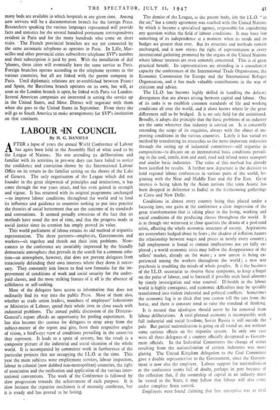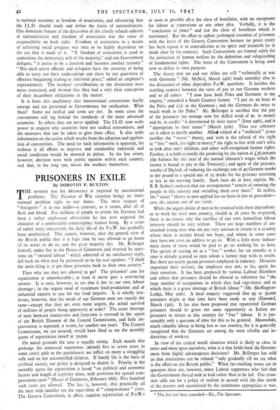LABOUR 4N COUNCIL
By H. G. DANIELS This world parliament of labour retains its old method of tripartite representation. The three partners—employers, Governments and workers—sit together and thrash out their joint problems. New- comers to the conference are invariably impressed by the friendly democratic atmosphere that prevails in the search for a common solu- tion—an atmosphere, however, that does not prevent delegates from tenaciously defending their own interests where they deem it neces- sary. They constantly join forces to find new formulas for the im- provement of conditions of work and social security for the under- paid classes, and the most striking feature of it all is the absence of selfishness or self-seeking.
Most of the delegates have access to information that does not ordinarily find its way into the public Press. Most of them also, whether as trade union leaders, members of employers' federations or Ministries of Labour, spend their whole lives in close touch with industrial problems. The annual public discussion of the Director- General's report affords an opportunity for pooling experiences. It has also become the custom for delegates to stray away from the subject-matter of the report and give, from their respective angles of vision, a bird's-eye view of conditions prevailing in the countries they represent. It leads to a spate of oratory, but the result is a composite picture of the industrial and social situation of the whole world. It is accompanied by committee work in furtherance of the particular projects that are occupying the I.L.O. at the time. This year the main subjects were employment services, labour inspection, labour in colonial (now dubbed non-metropolitan) countries, the right of association and the ratification and application of the various inter- national conventions. The work of the Conference is followed by slow progression towards the achievement of each purpose. It is slow because the tripartite machinery is of necessity cumbrous, but it is steady and has proved to be lasting. The demise of the League, as the parent body, left the 1.L.O. "in the air," but a timely agreement was reached with the United Nations by which it became a specialised agency, responsible for considering any question within the field of labour conditions. It may have lost something of its independence at a moment when its needs and its budget are greater than ever. But its structure and methods remain unchanged, and it now enjoys the right of representation at every international gathering promoted by the organs of the United Nations where labour interests are even remotely concerned. This is of great practical benefit. Its representatives are attending in a consultative capacity the conferences of the International Trade Organisation, the Economic Commission for Europe and the International Refugee Organisation, and it has made valuable contributions in the way of criticism and advice.
The I.L.O. has. become highly skilled in handling the delicate divergences that are always arising between capital and labour. One of its tasks is to establish common standards of life and working conditions all over the world, and it alone knows where lie the great differences still to be bridged. It is no safe field for the uninitiated. Broadly, it adopts the principle that the basic problems of an industry are the same wherever that industry is carried on. It is constantly extending the scope of its enquiries, always with the object of im- proving conditions in the various countries. Lately it has varied its method by transferring its researches to the more important industries through the setting up of industrial committees—still tripartite in composition—to discuss on an international basis conditions prevail- ing in the coal, textile, iron and steel, road and inland water transport and similar basic industries. The value of this method has already been justified by results. A further new departure is the decision to hold regional labour conferences in various parts of the world, be- ginning with the Near and Middle East and the Far East. Great interest is being taken by the Asian nations (the term Asiatic has been dropped in deference to India) in the forthcoming gatherings at Cairo and New Delhi.
Conditions in almost every country being, thus placed under a focusing lens, one gains at the conference a clear impression of the great transformation that is taking place in the living, working and social conditions of the producing classes throughout the world. It is as though one witnessed at close quarters the drama of a profound crisis, affecting the whole economic structure of society. Aspirations are everywhere hedged about by fears,; the shadow of inflation haunts the relationship between wages and prices in nearly every country ; full employment is found to contain implications not yet fully ex- plored ; a world economic crisis may follow the disappearance of the sellers' market, already on the wane ; a new unrest is being ex- perienced among the workers throughout the world ; a new war psychosis is troubling the minds of whole peoples. It it the business of the I.L.O. secretariat to observe these symptoms, to keep a finger on the pulse of labour, and to forestall if possible such local ailments by timely investigation and wise counsel. Ill-health in the labour world is highly contagious, and economic difficulties may be speedily transformed into violent industrial and political conflicts. Sometimes the economic fog is so thick that you cannot tell the cart from the horse, and there is constant need to raise the standard of thinking.
It is natural that ideologies should never be far removed from labour deliberations. A total planned economy is incompatible with full industrial and social freedom; Soviet Russia is still outside the pale. But partial nationalisation is going on all round us, not without some curious effects on the tripartite system. In only one case were all three delegates of a country officially designated as Govern- ment officials. In the Industrial Committees the change of status resulting from the nationalisation of certain industries was more glaring. The United Kingdom delegation to the Coal Committee gave a double representation to the Government, since the Govern- ment is now also the employer. Labour support for nationalisation at the- conference seems full of doubt, perhaps in part because of the reflection that, if the ownership of capital in an industry must be vested in the State, it may follow that labour will also come under complete State control. Employers were found claiming that free enterprise was as vital to national economy as freedom of association, and advocating that the I.L.O. should study and define the limits of nationalisation. One dominant feature of the discussion of the closely related subjects of nationalisation and freedom of association was the sense of responsibility on both sides. Freedom of association as a means of achieving social progress was seen to be highly dependent on the use that is made of it. " If freedom of association is used to undermine the democratic will of the majority," said one Government delegate, " it ceases to be a freedom and becomes another tyranny." "Not until. union officials and delegates have the certainty of being able to carry out their undertakings can there be any guarantee of effective bargaining leading to industrial peace," added an employer's representative. The workers' contributions to the discussion were more restrained, and showed that they had a very clear conception of their incumbent obligations in the matter. • It is from this machinery that international conventions finally emerge and are presented to Governments for ratification. What then? Some are ratified and some are not. In some cases the conventions still lag behind the standards of the more advanced countries. In others they are never applied. The I.L.O. now seeks power to enquire why countries have not ratified conventions, and the measures that can be taken to give them effect. It also seeks information on the action which results from the adoption and applica- tion of conventions. The need for such information is apparent, for without it all efforts to improve and standardise industrial and social conditions would be doomed to defeat. In the last resort, however, decision rests with public opinion within each country, and that, in the long run, means the workers themselves.



































 Previous page
Previous page